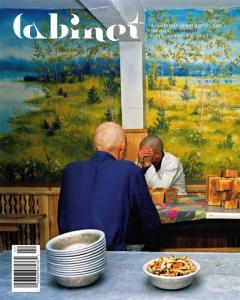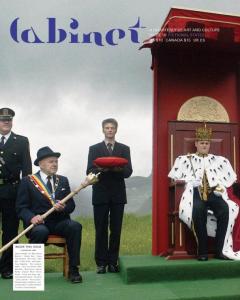Cabinet on Trial: A Magazine of No Qualities?
Multimedia:
Listen to an audio recording of this event.
 Cabinet no. 46 (“Punishment”), Summer 2012For more than a decade, Cabinet has published essays and artist projects that have ranged far and wide in topic and tone. To some, this breadth of interests suggests an ethically grounded culture of curiosity about the world. For others, this eclecticism is merely the symptom of an undisciplined dilettantism that fails to engage the crucial issues of today. It is time for a reckoning! In connection with the launch of Cabinet’s new anthology, those responsible for the publication will be called to the dock to answer for their activities. Inspired by Dada mock trials, this event brings together a formidable cast of litigators and judges in a format mixing serious debate with courtroom drama.
Cabinet no. 46 (“Punishment”), Summer 2012For more than a decade, Cabinet has published essays and artist projects that have ranged far and wide in topic and tone. To some, this breadth of interests suggests an ethically grounded culture of curiosity about the world. For others, this eclecticism is merely the symptom of an undisciplined dilettantism that fails to engage the crucial issues of today. It is time for a reckoning! In connection with the launch of Cabinet’s new anthology, those responsible for the publication will be called to the dock to answer for their activities. Inspired by Dada mock trials, this event brings together a formidable cast of litigators and judges in a format mixing serious debate with courtroom drama.
Since its launch in late 2000, the art and culture quarterly Cabinet has aimed to encourage a new culture of curiosity, one that forms the basis both for an ethical engagement with the world as it is and for imagining how it might be otherwise. The publication’s new anthology, Curiosity and Method: Ten Years of Cabinet Magazine, gathers some of the most interesting successes, and a few instructive failures, published in its first forty issues. Taking the form of an illustrated encyclopedia, the idiosyncratic entries include Addiction, Animal Architecture, Goalkeeping, Micronation, Otolith, Sandal, Worlding, and Zoosemiotics. The book also features seven new essays on keywords that have been important in framing the project of the magazine, including Collecting (Barbara Benedict), Attention (Lorraine Daston), The Everyday (Jeff Dolven), Pranks (Anthony Grafton), Listening (Daniel Rosenberg), Curiosity (Justin E. H. Smith), and Pleasure (Marina Warner).
 Cabinet no. 44 (“24 Hours”), Winter 2011/2012
Cabinet no. 44 (“24 Hours”), Winter 2011/2012
The participants in this event are:
Julieta Aranda is an artist based in Berlin and New York. Her work has been exhibited at Witte de With (2013), Museo d’Arte Contemporanea Villa Croce, Genoa (2013), Documenta 13 (2012), Gwangju Biennial (2012), Venice Biennial (2011), and the Istanbul Biennial (2011), among others. As a co-director of e-flux together with Anton Vidokle, Aranda has developed the projects Time/Bank, Pawnshop, and e-flux video rental, all of which have traveled to venues worldwide.
Claire Bishop is Associate Professor in the PhD Program in Art History at CUNY Graduate Center, New York. Her publications include Installation Art: A Critical History (Tate/Routledge, 2005) and Artificial Hells: Participatory Art and the Politics of Spectatorship (Verso, 2012), and she is a regular contributor to Artforum.
D. Graham Burnett is an editor at Cabinet. He is the author of Masters of All They Surveyed (Chicago, 2000), A Trial by Jury (Knopf, 2001), Descartes and the Hyperbolic Quest (APS, 2005), Trying Leviathan (Princeton, 2007), and The Sounding of the Whale (Chicago, 2012). He recently co-curated The Slice: Cutting to See at the Architectural Association in London. With Jeff Dolven, he teaches “Critique and Its Discontents” at Princeton University, where he runs the graduate program in History of Science.
 Cabinet no. 36 (“Friendship”), Winter 2009/2010
Cabinet no. 36 (“Friendship”), Winter 2009/2010
Nick Denton is the founder of Gawker Media, the parent company of Gawker.com, Deadspin, Lifehacker, Gizmodo, io9, Kotaku, Jalopnik, and Jezebel. Denton studied politics and economics at Oxford University.
Natalie de Souza is an editor at Nature Methods since 2006. Before working at Nature Methods, she studied cell fate in the roundworm at Columbia University and protein movement within cells at Rockefeller University. She has written for nature publications and for Cabinet.
Hal Foster is Townsend Martin Class of 1917 Professor of Art and Archaeology at Princeton University. An editor at October, recent books include Prosthetic Gods (MIT Press, 2004), concerning the relation between modernism and psychoanalysis; and Design and Crime (Verso, 2002), The Art-Architecture Complex (Verso, 2011) and The First Pop Age: Painting and Subjectivity in the Art of Hamilton, Lichtenstein, Warhol, Richter, and Ruscha (Princeton University Press, 2011).
Ben Kafka is an associate professor of media theory and history at New York University and a candidate at the Institute for Psychoanalytic Training and Research (IPTAR); he works with adults and adolescents through the IPTAR Clinical Center and the NYC Free Clinic. His most recent article for Cabinet, written with Jamieson Webster, was about a copy of Anti-Oedipus hand-illustrated by Deleuze’s children. Kafka is the author of The Demon of Writing: Powers and Failures of Paperwork (Zone Books, 2012).
Nina Katchadourian is an American artist known for conceptual works that explores themes of mapping, translation, and public space. Her projects have been exhibited widely, including a solo show of video installations at the Museum of Contemporary Art San Diego in July 2008. In February 2010 she was the artist in residence at the Dunedin Public Art Gallery in Dunedin, New Zealand, where she had a solo show entitled "Seat Assignment." She is currently at work on a permanent public piece, commissioned by the GSA, for a border crossing station between the US and Canada. Katchadourian is represented by Catharine Clark gallery in San Francisco.
Frederick Kaufman is a contributing editor at Harper’s Magazine. His most recent book is Bet the Farm: How Food Stopped Being Food (Wiley, 2012).
David Levine is an artist and Cabinet contributor. He makes work about acting, spectatorship, and the labor involved in both. His most recent work in New York was Habit, a durational performance at the Essex Street Market in September, 2012. He is currently a Fellow at the Radcliffe Institute for Advanced Study at Harvard, and the Director of Studio and Performing arts at the ECLA/Bard College in Berlin, where he is a Professor.
 Cabinet no. 18 (“Fictional States”), Summer 2005
Cabinet no. 18 (“Fictional States”), Summer 2005
Gideon Lewis-Kraus writes about books and culture for Wired, Harper’s, GQ, the London Review of Books, n+1, McSweeney’s, and elsewhere. His digressive travel memoir, A Sense of Direction, about pilgrimage and restlessness, appeared this past spring from Riverhead Books.
Sina Najafi is editor-in-chief of Cabinet magazine and the editorial director of Cabinet Books. Najafi has also curated or co-curated a number of exhibitions, including Philosophical Toys (Apex Art, 2005), The Museum of Projective Personality Testing (Manifesta 7, Trento, 2008), Odd Lots: Revisiting Gordon Matta-Clark's Fake Estates (White Columns and Queens Museum of Art, 2005), and the traveling exhibition The Paper Sculpture Show (2003-2007). He has taught at Cooper Union, Yale, and RISD, and studied Comparative Literature at Princeton University, Columbia University, and New York University.
George Prochnik is the author most recently of In Pursuit of Silence: Listening for Meaning in a World of Noise (Doubleday, 2010). He is currently completing a book about Stefan Zweig and exile, which will be published by Other Press. Prochnik is a regular contributor to Cabinet, and has written for Bookforum, The New York Times, The Boston Globe, and Playboy, among other publications.
Sergio Muñoz Sarmiento is an artist and art lawyer. He teaches contemporary art and law at Fordham Law School and founded The Art Law Program. Recently worked on an appeal on behalf of Christoph Büchel in the artist's dispute with the Massachusetts Museum of Contemporary Art, and has also co-written amicus briefs for the Seventh Circuit Court of Appeals and the US Supreme Court regarding another high-profile artists' rights case, Chapman Kelley vs. Chicago Park District.
 Cabinet no. 12 (“The Enemy”), Fall/Winter 2005
Cabinet no. 12 (“The Enemy”), Fall/Winter 2005
Lytle Shaw is a New York–based writer and poet whose books include Cable Factory 20 (Atelos, 1999), The Lobe (Roof Books, 2002), Principles of the Emeryville Shellmound Shark Books (1998), and Frank O’Hara: The Poetics of Coterie (University of Iowa Press, 2006). With Jimbo Blachly, Shaw oversees the Chadwick family archive, which has been exhibited widely and is represented by Winkleman Gallery in New York. He teaches in the English Department at New York University.
Mary Walling Blackburn is an artist currently investigating extraterrestrial encounters as a form of expatriate experience and as a vehicle for rethinking the terms of the Other; her research has taken her to Turkey, France, and Texas. Forthcoming publications include a visual project for e-flux journal titled “Sister Apple, Sister Pig,” and Ugly Duckling Presse will soon be issuing her broadsheet “Checklist: Apocalyptic Ecology.”
Ben Wizner is the Director of ACLU's Speech, Privacy & Technology Project, which is dedicated to protecting and expanding the freedoms of expression, association, and inquiry; expanding the right to privacy; and ensuring that civil liberties are enhanced rather than compromised by new advances in science and technology. Wizner is a graduate of Harvard College and New York University School of Law.
Alexi Worth is a painter, curator, art critic, and writer who is known for his conceptually rich and visually graphic works that address modern life and artmaking. He is currently represented by DC Moore Gallery, New York.
This event is organized in collaboration with Arezoo Moseni.